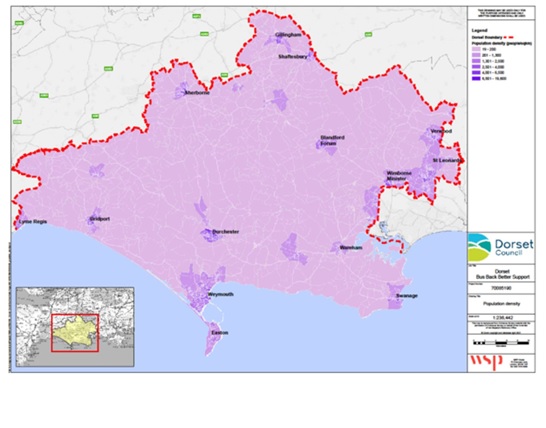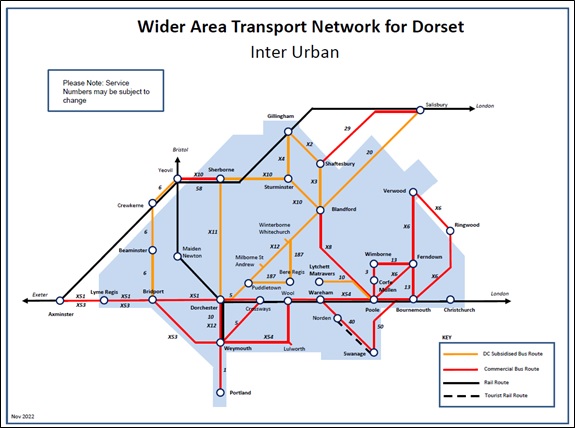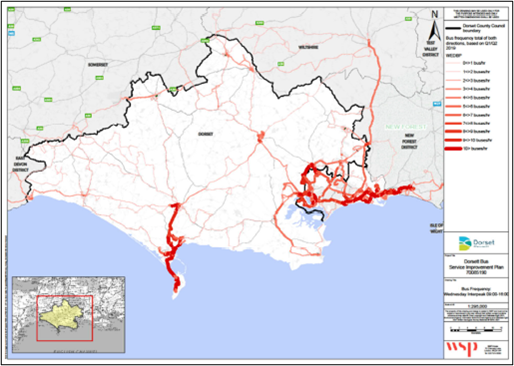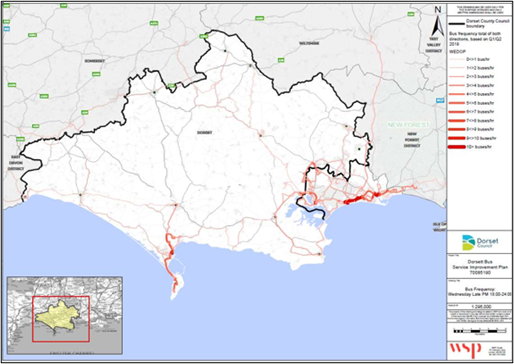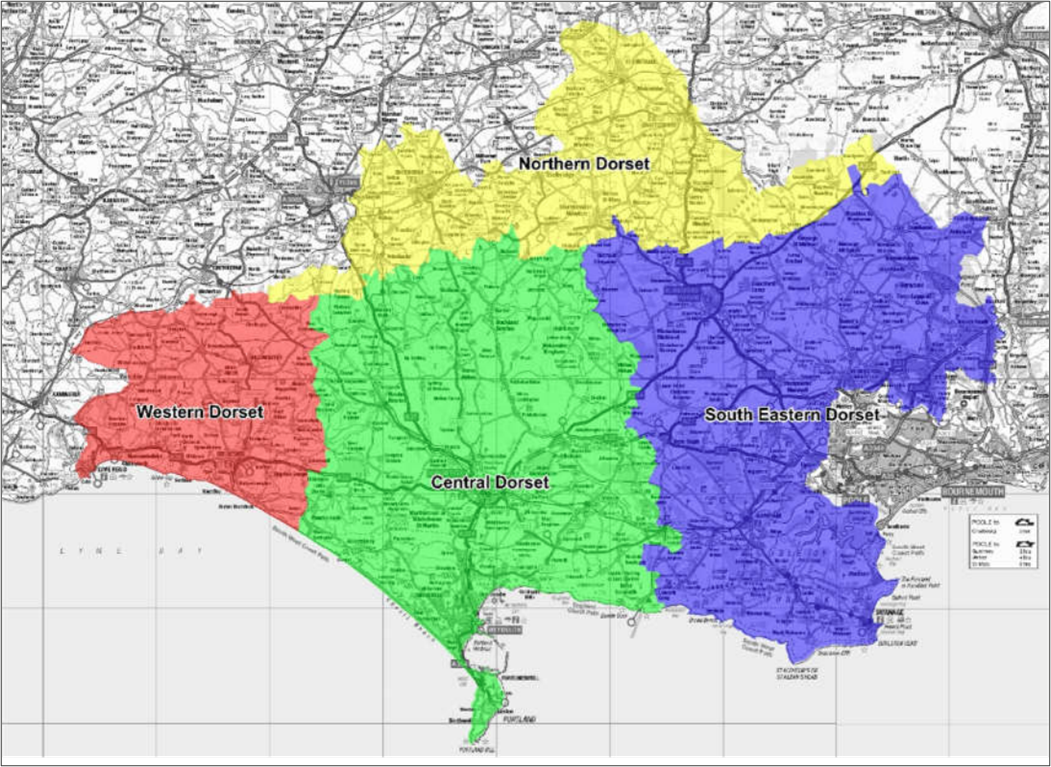Dorset is an area with significant transport challenges that need to be overcome in order to transform public transport.
Rural mobility
Rural areas face specific accessibility and connectivity challenges. Large areas in rural Dorset have no bus service and rely on community and voluntary transport services to fill the gaps. Our rural communities therefore suffer poor access to daily essentials, increasing social isolation and reduced opportunities, as well as seeing greater impacts from the cost-of-living crisis.
Rural areas have a significantly higher climate impact per person than urban areas. Urban areas have seen greater emissions reductions than rural areas because of national policy and local initiatives. Rural areas face different challenges in delivering net-zero than their urban counterparts and will require different approaches and solutions. Specific challenges include:
- limited options for active and public transport
- a high dependence on car travel, due a lack of frequent and affordable public transport and longer distances to access services. This car dependency is exacerbating the challenge of tackling climate change in rural areas
- poor digital connectivity. Average download speeds are substantially lower in rural areas than urban areas and can limit the ability to work, run businesses and access digital services
- limited grid capacity impacts the deliverability of electric vehicle charging infrastructure.
- population sparsity limits opportunities for at scale programmes and private sector investment
- higher costs of service delivery
- older population
- lower government funding per person. Rural places are financially left behind, unable to fund mobility solutions and increasing transport deserts. The delivery and the long-term operation of mobility services and infrastructure in rural areas requires sustainable funding from a range of sources both public and private sector but also from the third sector
Funding
The amount of funding available to support local bus provision has fallen dramatically since 2008 due to a decrease in central government support funding for local authority bus services. Since 2017/18 the council has received zero central government funding.
The council’s current annual budget (2022/23) for public bus service provision is £1.2m. Several contracts for subsidised routes were handed back to the council during 2022 and others are reaching the end of their contract periods. It is expected that there could be an increase of up to 100% to replace the services. These services are being retendered using a new contract model which will give the council greater control over service levels and fares, with the council in future retaining the revenues. The council is seeking to identify sources of funding to enable it to increase the budget supporting public bus services from 2023/24 and beyond.
Public transport routes, particularly those subsidised by the council provide transport to schools for those children who are entitled to free school transport as well as others who use the network to access school and colleges, so their continuation is essential.
It was estimated that to deliver the 2021 BSIP programme in full would require an initial investment between 2022 and 2025 of £92 million, capital and revenue, with further funding required beyond 2025. The funding requested sought to address public and stakeholder priorities for more buses, to more locations and operating across more hours alongside additional priorities for lower and simpler fares, faster and more reliable bus services, and greener vehicles. Without access to additional government grant funding, it is not possible to deliver these actions in full and therefore this BSIP refresh seeks to reset the short to medium term goals and focus on deliverable actions that can be achieved through existing programmes and closer partnership working.
Operational risks
There is a very small pool of bus operators in the area. This creates risks in terms of tendering contracts and securing value for money. In August 2022 Yellow Buses, who operated across the south east Dorset area, went into liquidation. Three other bus companies have withdrawn services and no longer operate in the council area. Three main companies remain in the county – two large, First Wessex and Go South Coast and one medium, South West Coaches. Dorset Community Transport runs five local bus routes in the south eastern and western areas. These link remote villages to larger towns, giving access to essential services.
There is still a risk that companies cannot maintain timetabled services due to the ongoing lack of drivers and rising costs across the industry. Contractors are struggling with staff retention – during COVID-19, many drivers left the industry to meet the demand for delivery drivers as online shopping increased.
Rising fuel costs have affected bus companies, particularly those that are smaller and cannot bunker fuel by purchasing when prices are lower.
Declining passenger numbers
Over the past 10 years Dorset has seen a significant reduction in passenger journeys on local bus services. COVID-19 has also had a dramatic effect on the number of people travelling as these figures show:
- 2018/2019 – 8.2m
- 2019/2020 – 7.6m
- 2020/2021 – 2.4m
- 2021/2022 – 4.8m
While passenger numbers have steadily grown through 2021/22 and 2022/23 they remain significantly below pre COVID-19 levels. Operator data shows that passenger numbers had only returned to between 70-80% of pre COVID-19 levels on many services by early summer 2022. This is due to a significant change in commuting patterns and a move to greater home working has seen people who traditionally commuted daily now travelling on fewer days each week. However, greater leisure travel has been evident on some routes and has helped passenger numbers recover better, particularly on popular tourist services.
The challenge facing operators and the council is how to encourage people to return to using the bus network while also attracting new passengers. Fare incentives will help along with other initiatives such as discouraging car use by reviewing parking prices. However, given the high number of ENCTS (English National Concessionary Travel Scheme) pass holders these incentives will attract a relatively small proportion of the population.
Operators have advised that their peak periods are moving away from the traditional Monday – Friday travelling to work peaks so they may consider adding weekend leisure travel opportunities to increase their passenger numbers. Modernising the fleets by having a minimum standard to be agreed between the council and operators will also attract new and younger users, especially if the buses are well equipped with new technology such as USB ports, audio-visual and next stop announcements.
An ageing population
Dorset’s population is significantly older versus the national average. While not unique, Dorset has one of the highest percentages of older people with 29.4% (111,658) aged 65 and over compared to an England average of 18.5%. (Office for National Statistics 2020). The 2021 Census data shows an increase of 24.8% in people aged 65 years (and over) and 33% of those aged 90 and over living in Dorset. The number of people aged over 65 is further expected to grow by nearly 50% over the next 25 years.
An ageing population presents major challenges with concessionary journeys being higher in Dorset versus the south west regional average. In 2019/20 45% of bus journeys were made by concessionary passengers, creating an over-reliance on concessionary income to support services. However, many people aged 65 and over are still choosing not to travel on public transport following the covid pandemic and this is impacting the ongoing viability of service provision.
The concessionary fares scheme has brought great benefits for older people, but the council is concerned operator reimbursement in rural areas is inadequate and operators in Dorset are losing out due to exceptionally high demand for concessionary travel. The council needs Government to recognise the significant challenge this poses in Dorset and other rural authorities by reviewing the concessionary travel scheme and make changes to the national policy to ensure it gives a fairer deal in rural areas and supports the delivery of better bus services in Dorset.
The high level of concessionary fares highlights the importance of bus travel for older demographics, but it is also recognised that these impact upon the economic viability and overall sustainability of services.
Young adults
Teenagers and young adults are bus users of the future. They have a unique set of problems to overcome with regard to public transport. Transport to and from school is provided for students who qualify, but this is usually one return trip a day and is usually only available for those from reception age to year 11. Students who rely on this transport may miss out on after school activities. Outside of the education system, young adults and students need services that give them independence to access leisure, further education and employment opportunities. This age group has been particularly affected by the COVID-19 pandemic and it is important that they have opportunities to regain a normal lifestyle. Having access to better public transport links can help support and improve mental health and wellbeing by reducing social isolation. In 2022 Dorset Young Researchers conducted a survey for young people on behalf of the Dorset Area of Outstanding Natural Beauty (DAONB) team. 846 young people responded. Although the survey was specifically about the Dorset AONB, the lack of public transport, particularly in rural areas was highlighted as a barrier to young people living in or trying to access the DAONB. In 2022 Dorset Young Researchers conducted a survey for young people on behalf of the Dorset Area of Outstanding Natural Beauty (DOANB) team. 846 young people responded. Although the survey was specifically about the Dorset AONB, the lack of public transport, particularly in rural areas was highlighted as a barrier to young people living in or trying to access the DAONB and other rural locations in the county. The cost of fares is another barrier. In Section 5 of the Dorset BSIP 2022 we have outlined our ambition to introduce a 16-25 young persons' bus ticket to encourage people of this age group use of public transport.
Seasonality
Significant tourism activity occurs in our coastal regions, especially along the Jurassic Coast between Purbeck and Devon. Commercially operated bus services between Lyme Regis, Bridport and Weymouth run all year round but they are enhanced during the summer months when the tourist activity is at its highest. Existing services in Purbeck are also enhanced during the summer months. Additional routes running to service campsites and tourist locations in the area are registered for the summer season along the coastal strip. Although these service uplifts are welcome, the winter timetables do not support residents and encourage them to use these services year-round. In the north of the council area although tourism is important, the numbers of people visiting are fewer than in the south and attractions and destinations tend to be on a smaller scale and bus routes remain the same throughout the year.
Further growth in tourism to Dorset’s world class natural environment is not sustainable without significant improvements to bus services within the county. The wider promotion of sustainable transport options to visitors is listed as a critical factor within the plan. Given the desire to increase tourism and leisure travel, a strong emphasis is placed on better weekend services with increased access to coastal areas, the Dorset AONB and additional areas such as Cranborne Chase.
Onward travel connections
Reliable onward travel connections are important to people. However, without more frequent services implementation is difficult, particularly where bus services are trying to connect with rail or coach journeys which are also infrequent. As well as trying to connect with other services there are other demands on bus services timetables such as carrying students to schools and colleges.
Fares – cost and complexity
There is a large range of ticket products available to bus customers. Average adult fares are slightly higher in comparison to national averages, figures for Dorset suggest a +£0.27 difference. There is no consistency for passengers and in some cases fares along the same stretch of road vary between operators. This is confusing for passengers, and it also means that they can be paying more than they need to for the same journey. There is currently no through ticket to allow people to travel on buses on one ticket on multiple operators’ services. There is also a lack of consistency in defining youth fares and the discounts vary across operators.
Until recently each operator set the fare structure for their services whether they were commercial or supported by the council. Under the councils new tendering model for supported routes, the council will now set the fares for those services operated on its behalf. The council intends to introduce a multi operator ‘Dorset Travel’ ticket that can be used across the network of supported routes and will engage with operators of the commercial networks to expand this across all routes in Dorset. We would also like to standardise a youth fare product for 16-25 year olds.
Reliability and punctuality
Bus punctuality is below the target of 95% within the window of tolerance (up to one minute early to five minutes late). Estimates of bus punctuality across the last eight years saw a gradual rise to a three-year period at 80% or more (from 2014/15-2016/17) before a notable drop to 70% (2017/18) which has stabilised at 72.9% (2021/22). This is substantially under both regional (81.9%) and national (83.0%) levels.
Traffic flows in Dorset are very seasonal, associated with the popularity of the area as a visitor destination. This can have a significant effect on local bus service punctuality in some of our urban and coastal areas with increasing traffic levels putting pressure on local bus operators’ ability to run reliably and punctually.
Large scale bus priority is not suitable in much of Dorset, especially in rural areas where traffic congestion and delays on bus routes are not common. Our street layouts often don’t provide the space to allow bus priority infrastructure to be constructed. Dorset will therefore require a targeted approach to bus priority to address the causes of delay and disruption and use a range of measures including bus lanes, bus gates, advanced signal priority, traffic management, road space re-balancing and placemaking interventions.



